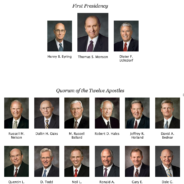I grew up Mormon
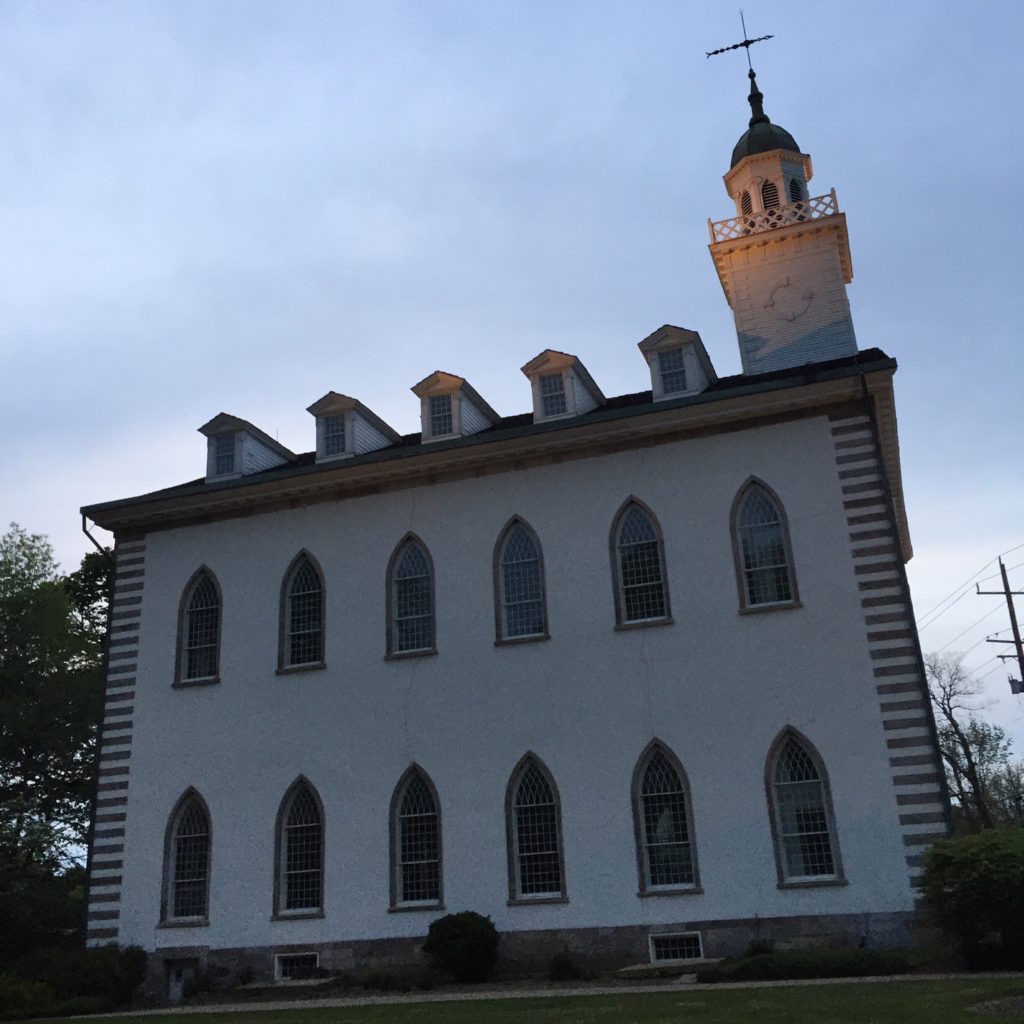
I grew up Mormon, I grew up going to the roadshows and firesides, I grew up doing Book of Mormon read-a-thons and skits. I grew up hearing stories of ancestors starting this church and crossing the plains. I grew up listening to leaders say that “women… should have without discrimination every political, economic and educational opportunity.” I grew up singing I’ll walk with you, I grew up reading scriptures that taught me to love one another, I grew up reading D&C 110:4 when Christ said, I am your advocate with the Father.
….and then I grew up. I grew up and I remember the day I felt converted. I grew up and remember the day I was married in the temple, I grew up and realized that the feeling of being less than in my community did not end when I grew up. I remember the day my son was blessed, and then baptized and introduced to my faith community. I also remember the day my daughter was baptized…. and I remember the differences. I grew up and realized that I couldn’t be a full participant in this amazing world, if I do not start speaking up. I remember the day that I read D&C 110:16 “The keys of this dispensation are committed into your hands.” and I realized that The Restoration was still in progress and that every member is a part of that. I have a role to play in that. My ancestors sacrificed their homes in Kirtland, their temple in Nauvoo, and their lives in Carthage. I grew up and read D&C 110:15 with new eyes, It is time “To turn the hearts of the fathers to the children, and the children to the fathers,” It is time for me to put a little bit of skin in the game, to make things better so my kids can grow up Mormon. It is time for me to be a Mormon Pioneer.
I believe it is time for us all to Pioneer Equality. Women, Men, Black, White, Queer, Straight, Nursery Leader, General Authority. It is time to stand up to witness. All of us. To make space for everyone to believe and proclaim and live our faith. Its time to speak up and make space for everyone to have a voice, to say that we aren’t happy with the status quo… and that’s okay! We can learn, and we can grow, together. It’s about teaching everyone that they can access God. Its about each of us using our unique and beautiful gifts and talents to build and move this community forward. It’s about creating the safer spaces that we desperately need not only for future generations but for ourselves. It’s about making Zion thrive, instead of just survive. Its about acceptance. It’s time to accept everyone as they are, equal, no one better then the other, and no more expecting others to fit in boxes meant for paper, not for people. It’s about growth and stretching ourselves to ponder something more. It’s time for us Mormons to grow up, it’s time to take the faith of our mothers and fathers and make it ours. We grew up learning that our faith was like a mustard seed, comparing it to a flower that will wilt and die if not tended to… what happens when we give that seed roots? When we combine it with the wisdom that has come before and the vision of a better tomorrow? The seed we thought was mustard or flowers grows up… to be something more, grows up to be something more then our ancestors could have imagined, something more we maybe haven’t let ourselves hope for… Then we might see what they meant in D&C 110:6 We might understand when the Lord has seen his saints grow he “lets the hearts of all His people rejoice,” The Lord joins his Saints and Rejoices in that growth.
It’s time to Ponder anew what the Almighty can do…..
It’s time for all of us to help Mormonism to grow up and start to Pioneer Equality.
Ready for Revelation
Joanna Smith Wallace, the author of this post, is on Ordain Women’s Executive Board.
Day of Fasting, Prayer, Reflection, and Meditation
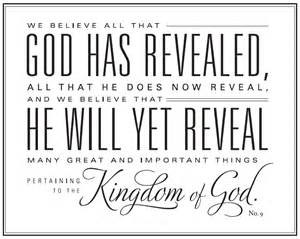 One of the most cherished tenets of the LDS faith is the doctrine of continuing revelation.
One of the most cherished tenets of the LDS faith is the doctrine of continuing revelation.
Our history is replete with instances where revelation was received because Church leaders, in response to the cries and pleas of our LDS siblings, took questions to God.
In the spirit and tradition of that history, we invite you to join us on Sunday, May 29th as we fast and pray that our present-day Church leaders will hear our cries and that they will seek revelation about ordaining women to the priesthood in the LDS Church.
Leftovers
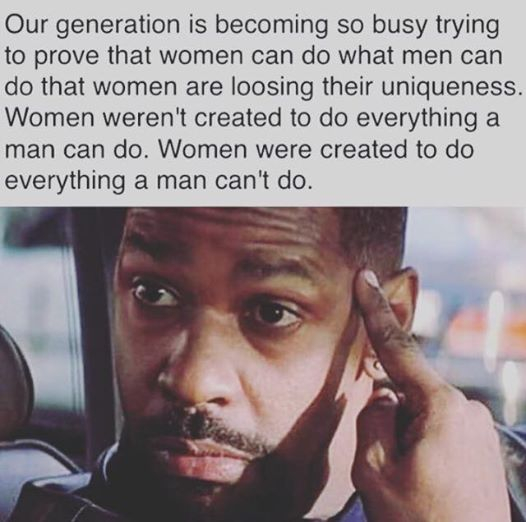
I have seen a meme posted a couple of times on social media that says “Our generation is becoming so busy trying to prove that women can do what men can do that women are losing their uniqueness. Women weren’t created to do everything a man can do. Women were created to do everything a man can’t do.” On the surface, I wanted to like this meme. I don’t want to lose what makes me, me; what makes me unique. I do not ever want to be caught up in trying to be someone else. However, it only took a second to realize that being female is not who I am. Being a woman is a part of me, but it doesn’t define me. It does not define what I am capable of. It does not define my potential. It does not even define my role in life. Being a woman does not put me in a box, restricting me to only womanly things. I get to just be me. And maybe being me means that I do things that people who are male do. Perhaps being me means doing things that other people who are female do. I am unique, but it certainly is not my gender that makes me unique. Heck, +/- 50% of the population shares my gender!
The last line of the meme is the one I really take exception to, “women were created to do everything a man can’t do”. I was not created to limit myself to whatever men can’t do. I do not get the leftovers. I get to do and accomplish everything I want and can do. I do not sit and wait for men to do what they can and then try to scramble up the scraps. I am me. I am not limited by what other people can do. In life, I have found a partner who compensates for my weaknesses and compliments my strengths, but in no way am I only ever doing what is left behind.
The scraps.
The leftovers.
I am more than leftovers. I am strong, I am confident, and I am capable. Sure, my biology means I have the opportunity to choose to experience pregnancy, a chance men never get, but other than that I do not see what boundaries there are put on me by my gender. There are smart women and smart men. There are strong women and strong men. There are creative women and creative men. There are hardworking women and hardworking men. The list goes on and on. Me being a woman has nothing to do with my capabilities.
When I seek for the ordination of women, I am not trying to be like a man. I am not trying to take over for a man. I am trying to reach my potential. I am trying to increase my capacity to serve. I am trying to strengthen my relationship with our Savior. I want to contribute in every way that I can.
I will not just wait for the leftovers.
Pope Francis Opens the Door For Greater Leadership and Service Roles for Catholic Women
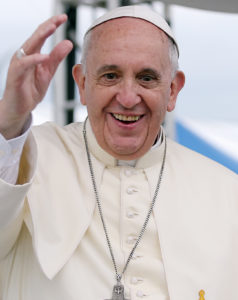
Yesterday, in what was described as a landmark moment, Pope Francis gave his approval to the establishment of a commission to study the possibility of ordaining women as deacons in the Catholic Church.
Traditional news outlets and social media have both been abuzz with comments hailing this action as being grounded in and recovered from history. It is news that well-known Jesuit Priest Father James Martin says brings “immense joy.” He goes on to point out, “women deacons would be able to baptize, preside at marriages and funerals, and preach during various liturgies [and] their preaching would mean that the church would finally be able to hear, from the pulpit, the experience of over half its members.”
Ordain Women shares the excitement of many of our Catholic sisters and brothers over this development. We echo the words of our colleague and fellow warrior, Kate McElwee, co-executive director of the Women’s Ordination Conference, who, in her comments to Religion News Service (RNS), described the move as a “huge step.”
Ordain Women will be watching to see the results of this commission and will continue to hope, pray, and advocate that LDS Church leaders will pray and seek revelation about ordaining women to the priesthood in the LDS Church.
Examining White Privilege in Mormonism?
I recently came across this article that looks at the way several churches are examining white privilege and trying to address racism within their congregations. I have personally attended meetings like this, and I am inspired by these congregations.
Although I am inspired by the progress I see in so many other religions and churches around race and racism, I can’t help but feel saddened by the lack of positive contribution on the subject in Mormonism. Why is racism not a Mormon issue? Is it because we are afraid to admit our own contributions to the current racial climate? Is it because our religion is tightly interwoven with American conservative ideals? Is it an ingrained preference for avoidance?
I want the common retort “They were influenced by the teachings of their time” to no longer be seen as a justifiable excuse for the policies and doctrines implemented by past and present leaders. I want to walk into church and stand confidently knowing that everyone else believes that we are all created equal and have been since the beginning of time. I want us to talk and walk with one another growing stronger and kinder in our understandings of each individual and their personal background and journey.
I pray that we as a church community, like these other churches mentioned in the article, will someday be able to look sincerely and honestly at our history of racial discrimination and acknowledge the harm that it caused and still causes. By examining the racism and privilege that divides our congregations, we will be able to mend the wounds of our past and move forward in unity.
In between the inspiration in this article and the sadness at the lack of Mormon participation, I still find hope and faith in the core principals of our teachings. We are all striving to love one another and to do so, we must start by seeing each and every person and honoring their path–that means seeing race and acknowledging race.
Blessed to be Raised by Mormon Feminists
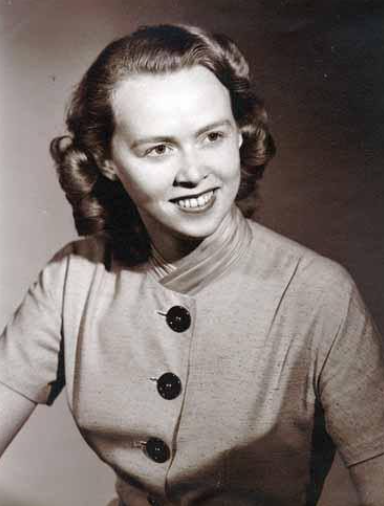
Before the term “Mormon Feminist” was coined, my mother, Elva Marchant Barnes, and my grandmother, Beatrice Peterson Marchant, were Mormon Feminists. I wish I could say that I always appreciated this fact, but in my younger years I felt pressure to conform, and every now and then felt embarrassed when I heard criticism of my mother and grandmother’s political activities. Despite these momentary lapses, most of the time they were my heroes. They were strong, smart, independent, and knew their own self-worth.
In the 1960s, my mother was politically active advocating for the passage of consumer protection laws and the elimination of the margarine tax in Utah. In 1968, my grandmother won election to a seat in the Utah House of Representatives, where she served for four years. During the 1970s and early 1980s, they both actively fought for ratification of the Equal Rights Amendment. To this end, my grandmother founded and served as president of the Equal Rights Coalition of Utah.
On this Mother’s Day, I would like to share a few memories these two strong women, who are at my core of who I am. They are why I am proud to be a feminist.
It’s a Sunday morning in August 1965. I am a six-year-old sitting in Sunday School class. My mother appears at my classroom door, and calls me out of class. We quickly find my brother and my father. We walk quickly to the car. I can see pain and anger in my mother’s face, as my parents put my little brother and me in the car. As my father drives out of the church parking lot, my mother begins to speak. She is never going back she says. She says something about the bishop and her underwear. She says something about men and power, and how women are left out. That was the last week that we regularly attended church as a family, although my brother and I attended in later years. Only when I was older, did I learn the full story.
My aunt was getting married in the Salt Lake Temple the next month. My mother scheduled a temple recommend interview with the bishop. During the course of the interview, he began asking detailed, intimate question, which she felt were inappropriate. She summoned the courage to tell him that she would not answer those types of questions. When he insisted, she stopped the interview, got up, left his office, and never went back. The ward (home) teachers, still visited our home each month, but she frequently told them that she would not return to the church, until women hold the priesthood.
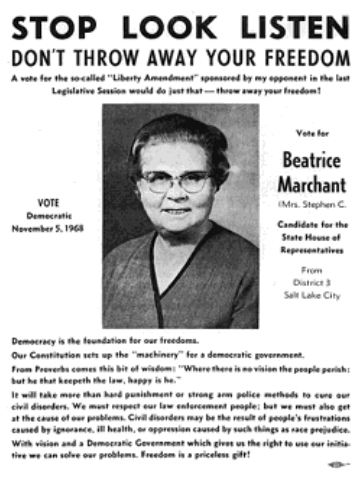
In the fall of 1968, my grandmother asked for help delivering campaign leaflets around her legislative district. She had fifteen children, which meant that I had over 100 cousins. Several of the cousins fanned out across her district to drop a leaflet at every door. After winning her seat, my mother became her legislative assistant, and several times I was able to watch my grandmother on the floor of the Utah House of Representatives. I felt a great deal of pride seeing my very smart and courageous grandmother do battle against with the John Birch Society and other right wingers in the state legislature.
After she left the legislature and shifter her focus to the ratification of the Equal Rights Amendment, some conservative church members would attack both her political stand, and question her worthiness as a member of the church. Despite these attacks, she carried on as the Relief Society President in the Liberty Ward, serving the many poor and elderly women living in that Salt Lake inner-city neighborhood.
Both my mother and grandmother were educators. My mother taught home economics, and later became a vice principal, district policy advisor, and member of the Utah Board of Regents. She lived what she preached, and was always learning new things. When personal computers came out in the 1980s, we both jumped into the new technology, and it became one of our shared interests. We spent hours and hours talking about computers. These types of exchanges were not limited to computers. Whatever my interests were, my mother could engage in meaningful, interesting, intelligent conversations.
She passed away one night in November 2006. A decade has gone by since that night, and I still miss our conversations. I miss her strength, I miss her intelligence, and I miss her love. My mother and grandmother taught me by their examples that women can be strong, capable leaders, who make the world a better place. Despite growing up in a patriarchal culture, their examples showed me that male superiority is lie. It is because of them that I am a feminist, and it is their memory that drives me to fight for equality in the Church.
Ready for Revelation
Mark Barnes, the author of this post, is on Ordain Women’s Executive Board
What if Church Leaders Looked Like the Children of God?
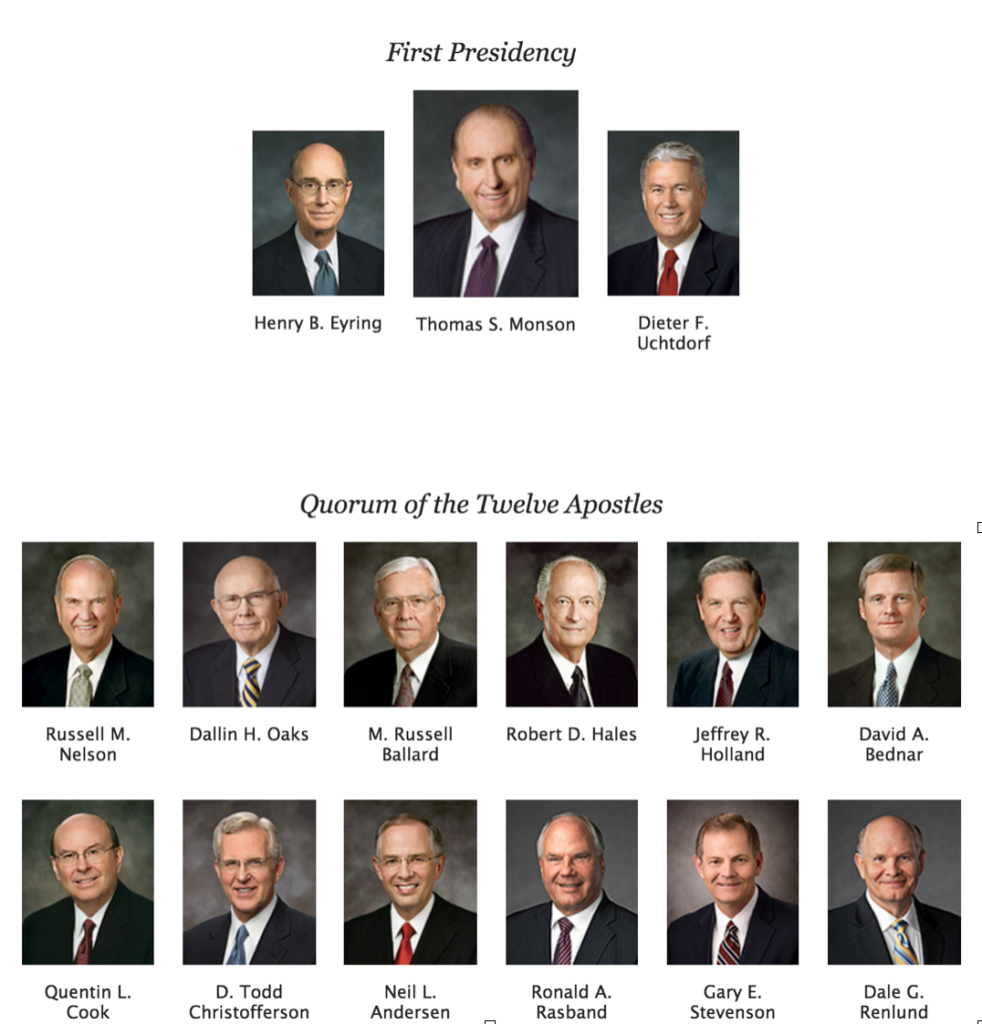
Today, top church leadership is composed of fifteen white men, fourteen of whom are Americans, and one is German. This composition is striking in its departure from the composition of God’s children upon the Earth.
If LDS Church leadership reflected the composition of God’s children, half would be women, and half would be men. One would be queer. Nine leaders would be from Asia, two from Africa, two from Europe, one from North America and one from South America.
The LDS Church proclaims that it is God’s one and only true church on the face of the Earth. The Book of Mormon says: “. . . he inviteth them all to come unto him and partake of his goodness; and he denieth none that come unto him, black and white, bond and free, male and female; and he remembereth the heathen; and all are alike unto God, both Jew and Gentile.” 2 Nephi 26:33.
Likewise, Paul proclaimed: “There is neither Jew nor Greek, there is neither bond nor free, there is neither male nor female: for ye are all one in Christ Jesus.” Galatians 3:28.
These scriptures tell us that God is not sexist or racist. God does not prefer one nation over another. Rather, God loves all people equally. Thus, we would expect to see this equality among the top leadership of the LDS Church.
As a Church we have a long road to travel to reach equality. Many were disappoint in October 2015, when three positions were filled in the Quorum of Twelve Apostles. Many hoped that this would be an opportunity to create a more inclusive leadership. When all three newly called apostles were white, male Americans, many members around the world were disappointed.
In coming years, Church leaders should make diversity a priority. As the old leadership is replaced, new leaders should reflect a love for all of God’s children. The engrained bias in favor of white, male American’s must disappear. But, first and foremost, the ban against women’s ordination must come to an end, so that leadership can include the half of humanity, which is currently completely and totally barred from Church leadership.
Ready for Revelation
Mark Barnes, the author of this post, is on Ordain Women’s Executive Board
The Mormon Woman Card
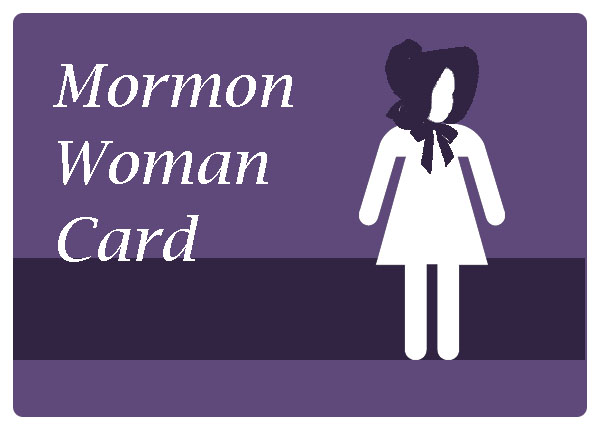
The Mormon Woman Card
“Frankly, if Hillary Clinton were a man, I don’t think she’d get 5 percent of the vote. The only thing she’s got going is the woman’s card.” Donald Trump
Regardless of your political leanings, Donald Trump’s recent “woman’s card” comment invited deserved commentary, some of it wryly hilarious. The Washington Post’s Alexandra Petri, for example, wrote: “Ah yes, the woman’s card. I have been carrying one of these for years, proudly. It is great. It entitles you to a sizable discount on your earnings everywhere you go … [and] if you shop with the Woman Card at the grocery, you will get to pay 11 percent more for all the same products as men, but now they are pink. … Show the Woman Card to your health-care provider and you will enjoy new limits on your reproductive rights, depending on what the legislators of your state have decided is wise. … Present the Woman Card to a man you have just met at a party and it is good for one detailed, patronizing explanation of the subject you literally got your PhD in.”
Like Petri, I’ve enjoyed the perks of the Woman Card for years. Drop the Woman Card in a discussion, and men might pat your face when you’re trying to make a point. Let it slip from your wallet, and you get infantilizing and clueless compliments like, “I thought you were just a normal girl, but you’ve got a head on your shoulders.” Since I’m considerably older than Petri and lived through the Mad Men era, my experience also taught me that the Woman Card bought you unsolicited sexual advances and innuendos from male bosses, doctors, educators and, yes, occasionally church leaders.*
Which brings me to the other card in my wallet—The Mormon Woman Card. It offers tons of added benefits.
The Mormon Woman Card entitles you to:
- Membership in one of the oldest and largest women’s organizations in the world—run by men.
- Countless talks by male Church leaders that define the scope of women’s experience, responsibilities and aspirations despite your experience, responsibilities, and aspirations.
- A glass ceiling, like that of your secular sisters, but it’s a stained-glass ceiling and, apparently, designed to last through the millennium. Despite your gifts, talents and abilities, it restricts access to the full range of Church callings and opportunities to serve that are available to men, even, arguably, where priesthood isn’t necessarily required.
- Religious texts, general conference talks, lesson manuals and decision-making councils composed of nearly all male voices.
- The assurance that your value as a woman is primarily linked to being a wife and mother—whether or not you’re single, widowed, divorced, childless or no longer have children in the home. This often leads to uncomfortable Mother’s Day celebrations at Church, both for the childless and the guilt-ridden child-weary. (The fact that women are expected to carry the Motherhood Card means they are discouraged from applying for the platinum access card of cards among Mormons—The Priesthood Card. Men, however, may apply for the Priesthood Card, whether or not they apply for the Fatherhood Card, and many seem to manage both. The reason for this gender discrepancy must be buried somewhere in the fine print.)
- A significant discount in Young Women budgets and resources as compared to the Boy Scout and Young Men programs.
- The expectation that, though you and your husband are equal partners in the home, he ultimately presides over you and your family. (In his absence, your ordained teenage son can fill in.)
- The opportunity for you or your daughter to sit alone in a room with an adult male priesthood leader and be interviewed about your sexual practices and worthiness to fully participate in Church programs and temple worship.
- Scrutiny as to whether or not your clothing covers enough of your knee or shoulder to keep male libidos in check.
The Mormon Woman Card. What’s in your wallet?
*For a podcast on ecclesiastical sexual harassment, listen here. References for bullet points can be found in All Are Alike unto God and OW’s Conversation One.
The Gold Standard
Trigger Warning: Sexual abuse/rape
I was fifteen. She was five. She described in graphic detail how her father had intercourse with her. What did I do? What did I do? There followed two months of intense panic where I didn’t eat and barely slept. I knew CPS existed but I didn’t have the phone book for her area. (This was pre-internet.) I knew from friends’ experiences that calling the police was useless. I knew that my family couldn’t help her. I told some friends and a teacher and asked what to do. They didn’t know either. They also told me that while child molestation occurs, it was very rare and she was probably lying.
If I wanted to be charitable to myself, I could say that they convinced me. But I can’t give myself that peace. I knew she was telling the truth. I kept that rape silent and I knew the whole time how awful that choice was. I literally didn’t know what else to do. Some people might want to offer people like me a millstone. But if you have ever walked this path, you might understand that maybe Jesus said that out of empathy. Maybe he knew that someone might want to be drowned instead of being in that situation.
My lack of knowledge was not because no one would talk about rape. We talked about it all the time in Young Women’s. We were told that if we wore short skirts, we would probably be raped. We were told that if we necked (whatever that was) we would be raped. At one point I was even told that if I talked to non-Mormon guys I would probably be raped at knife point. (Don’t ask, I still haven’t figured out the point of that lesson.) The bottom line was that if I put one toe out of line, I could expect violent and degrading sexual assault.
So why, at fifteen, did I not have the number of a rape crisis hotline? At one point I, and 20 other girls, got a starched and ironed white handkerchiefs with a cutesy poem for a chastity lesson. It was color-printed which cost a dollar a sheet back in the 80s. But no preparation to deal with our inevitable rapes?
On February 1st , the church highlighted an old press release, “Effectiveness of Church Approach to Preventing Child Abuse.” This has led to lots of online discussion of how the preparation of bishops and other youth leaders can be brought up to a “gold standard”. Many have suggested that background checks would curtail the problem of child abuse in the LDS church. Let me put things in perspective: I was a foster parent for about three years. I was background-checked, had to write a detailed and thoughtful discipline plan, and was interrogated very uncomfortably about any abuse I might have experienced. But very few people think “anti-abuse gold standard” when they hear “foster parent.” My background process wasn’t the “gold standard” it is barely the plastic standard. The gold standard hasn’t been invented yet.
It’s tempting to say that if there were women apostles, issues like these would be on the leaders’ radar screens. While women as a whole may be more aware of abuse and assault, let’s remember that it was women leaders who gave me an unrealistic view of rape and ill-prepared me to protect the little girl I baby-sat.
So when I visit this subject, I won’t just ask where the women or minority apostles are. I’m going to ask: why we don’t have social worker apostles along with the surgeons? Why don’t we have school teachers along with the educational administrators? Why don’t we have police officers with the judges? Why don’t we have apostles who have worked as a full-time child care providers, summer camp counselors, or coaches? Why don’t we have apostles who were born into poverty in developing nations and who have watched their governments clean out the crumbs of nepotism, abuse, and injustice? Such people make for good conference talks. Why can’t we hear conference talks from them?
I don’t talk about this much because people tell me to get over it and to stop blaming myself. This little girl struggled with demons through high school, adulthood and was eventually institutionalized long-term. It wasn’t a little passing trauma for her. I don’t let it poison my life. But I am also not ready to smooth it out or sugar-coat it and make myself feel better. I want the memory to stay ugly because I am afraid that I might conclude that there really was nothing I could do. Maybe I’d pat myself on the back and give myself a gold standard star.
When the Saints were scratching a living in the Utah desert, they built the acoustic wonder called a Salt Lake tabernacle. They built it without nails. When I was a child, this building symbolized that my parents had adopted a religion that was committed to innovation and thinking outside the box. The church has everything and everyone within its membership to build a gold standard for child protection. But we can’t do the same thing year after year or follow the same old patterns. They never would have finished the tabernacle if they had said, “Hey, we need more nails over here.” We will never build the gold standard if we look for the same kinds of leaders over and over again.
Please Don’t Lose Faith in Me.
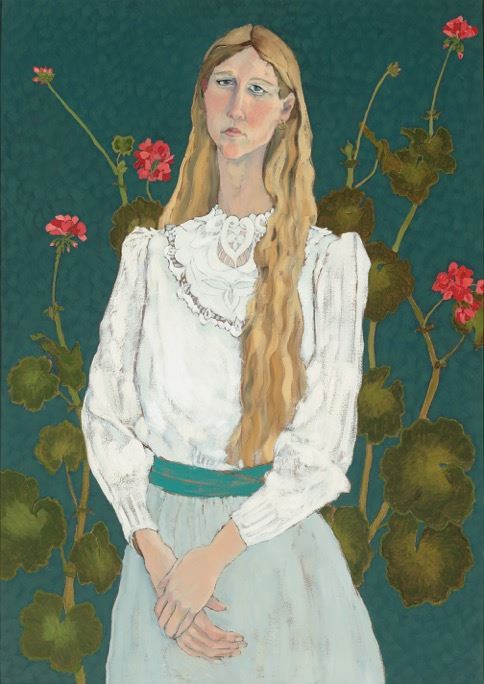
Painting by Lee Udall Bennion
Last week I heard L. Whitney Clayton speak to graduation BYU students, the talk has had me contemplating almost nonstop for days.
I was raised Mormon. Born in the church, attended every road show, ward potluck and pioneer day bike parade there was. It was the best childhood ever. Our neighbors loved each other and we served each other. I learned what service was when my Mom brought over meals to her close friend who had a baby that was born the size of my 8 year old hands. I learned what addiction was when a neighbor and friend was admitted into rehab and the entire neighborhood held a weekly fast for months. I learned what forgiveness was when the young men in the ward shot a BB gun at the neighbor. I learned what patience was when our YM/YW group walked through the deserts of Utah in pioneer skirts. I learned what compassion was when my Mia Maid group visited a widow every week during Christmas. I learned who Christ was when I was struggling with depression in high school and everyone in the neighborhood rallied around me to stay alive, and stay positive and told me daily that I was loved.
Fast forward 15+ years, 3 wards, 10 callings, 4 kids and 1 husband leaving the church…. As much as I’ve struggled with my questions about women (lack of) equality in the church, I feel like I’ve always had the privilege of a firm foundation and strong childhood. Examples of how to do life and religion and relationship-with-the-Savior right. Leaders who loved me exactly as I was and taught me that I was valuable. Neighbors and ward members who looked after each other and prayed for each other and supported each other. I don’t know a lot of people in this world who are doing religion 100% right all the time but, I was lucky to be surrounded by amazing people who were always trying. I was surrounded my a ward that never lost faith in each other.
So imagine the punch in the gut feeling when Elder Clayton said in front of thousands of BYU graduates and their families….
“A few of you may have run into some who cease to hold fast to the iron rod wandered off the straight and narrow path, and have become lost. …. We should disconnect immediately and completely from …those who have lost their faith”
Really? This? This is what we need to do? This is the example Christ gave us? To disconnect from those who might not agree with us completely? Did Christ teach us that we are superior to those with different trials then ours? Please tell me NO! Christ was the example of rallying around those in need, of listening to those with tears, of leaving the body of the church to reach out to the one.
So here I am…. BEGGING you not to listen to Elder Clayton. and yes, I see exactly that many will read this and say, “See, she’s the one he’s talking about in his talk.” and maybe I am…. but I need you. I need the members of the church to have faith in me as I struggle to be a better mom. I need my Bishop to have faith in me as I struggle in my calling. I need my visiting teachers to have faith in me when I’m crying to them about how hard going back to school is. I need my siblings to pray for me and my kids when they see us hurting. I need to be a part of the body of Christ. I might be wrong, women might not be part of the restoration but I want to get those answers from The Lord. I want to feel The Lord answer my prayers and I want my kids to see that it’s okay to ask. I want my kids to see that just like Joseph Smith knelt in a grove with his questions, they too can go to The Lord with their questions. I want my kids to see that the people in their wards and neighborhoods are never going to lose faith in them when they stumble. So here I am- a sinner and a liberal and a feminist and a women and a mormon – begging you, my fellow ward member, not to lose faith. Begging you not to judge. Begging you to see my trials as just that, trials. Please don’t label me as inferior because we are different. Don’t disconnect. CONNECT! Don’t lose faith in the gay or lesbian or Trans members in your stake. Don’t lose faith in the ward pants wearing feminist. Don’t lose faith in the Chain smoking, inactive Dad of your primary kids. Don’t lose faith in the single Mom who doesn’t make it to church every week. Don’t lose faith in those of us wanting to make the tent a little bit bigger. Don’t lose faith in the people struggling to hold onto the church they love so much. Please, don’t lose faith in those of us that are struggling. We need you.
“It matters not how completely ruined our lives may seem. It matters not how scarlet our sins, how deep our bitterness, how lonely, abandoned, or broken our hearts may be. Even those who are without hope, who live in despair, who have betrayed trust, surrendered their integrity, or turned away from God can be rebuilt.”
-Dieter Uchtdorf
Ready for Revelation
Joanna Smith, the author of this post, is on Ordain Women’s Executive Board








